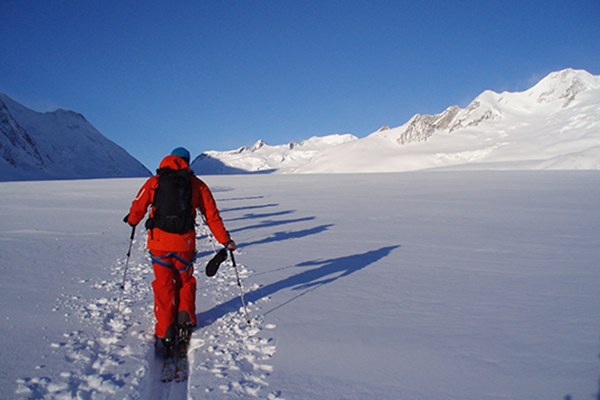News
Chemicals in the Alps– unwanted souvenirs

Outdoor enthusiasts also contribute to the spread of persistent organic pollutants (POPs). These substances are usually released into the environment as unwanted by-products of industrial processes. Alongside innumerable other areas of application, for example in the automobile or electronics industries, POPs are also used in the outdoor industry, e.g. in dyeing processes or to make equipment dirt- or water-repellent. From clothing and shoes, to ski wax and sleeping bags, chemical substances are utilised everywhere in production. The cold conditions of high-altitude Alpine areas mean that the pollutants accumulate in such places in particular and stay there for a very long time.
The international research project Monarpop, conducted at 40 locations in the Alps on behalf of the Austrian Office for Environment Protection, has demonstrated the existence of POPs in the air, in the water cycle (in snow) and in the biomass (in pine needles). A time series is now available for the first time. The values recorded are comparable to those in cities: according to the researchers, the Alps act as a natural barrier for the air masses that carry pollutants, thus allowing these to accumulate.
In the public view, the main concern up until now has been the problem of particulates in the Alpine valleys and along major transit axes. It is thus particularly worrying that persistent organic pollutants accumulate not just in the air, but also in biological matter. That means they are present in our food and our drinking water, and can in this way enter our bodies. They are demonstrably a danger to health, are carcinogenic and hormonally active, and are linked to damage to the immune and fertility systems. As a preventive measure, therefore, their use is regulated by the UN’s “Stockholm Convention”. The study however shows that the agreements are insufficient to deal with the problem.
At least those practising mountain sports can help in the fight against the spread of such pollutants: according to Greenpeace some outdoor wear producers are using fluorine-free recycled membranes made of polyester as well as fluorine-free impregnations, with quality seals to help consumers decide.
Sources and further information:
www.umweltbundesamt.at/aktuell/presse/lastnews/news2016/news_160322/ (de), www.umweltbundesamt.at/fileadmin/site/publikationen/REP0546.pdf (de), www.greenpeace.de/sites/www.greenpeace.de/files/publications/s01761_greenpeace_chemie_natur_08092015_1.pdf (de), http://chm.pops.int/TheConvention/Overview/tabid/3351/Default.aspx, https://utopia.de/0/magazin/die-wichtigsten-siegel-fuer-kleidung-ohne-gift (de)


